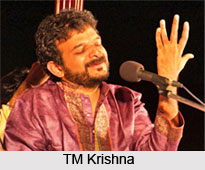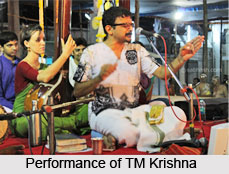 TM Krishna was born on 22nd January in the year 1976 to a business family. He has explored the world of music when he was only 4 years old. He started receiving training in music from his mother`s music guru B.Seetharama Sharma at the age of 6 years. Though he was born into a business family but his family always possessed an interest in the field of music. For the last 17 years TM Krishna`s mother has been running a music school in Chennai.
TM Krishna was born on 22nd January in the year 1976 to a business family. He has explored the world of music when he was only 4 years old. He started receiving training in music from his mother`s music guru B.Seetharama Sharma at the age of 6 years. Though he was born into a business family but his family always possessed an interest in the field of music. For the last 17 years TM Krishna`s mother has been running a music school in Chennai.
TM Krishna has done his schooling from `The School` K.F.I. The J.Krishnamurthy Trust has run this school. Afterwards he obtained his graduation in economics from Vivekananda College. As TM Krishna has started receiving training in the art of classical vocal music from a very early age, he has been admitted to receive special training called Ragam Thanam Pallavi (a special component in a Carnatic music concert) training under Sri Chengalpet Ranganthan. Later on for more than seven years he received expert guidance from Dr Semmangudi Srinivasa Iyer.
Today TM Krishna has been reckoned as one amongst the leading artists in the field of Carnatic music (Indian classical music-south Indian style). From the tender age of 12 years, he has started exhibiting his talent in public. TM Krishna has been considered as the `youngest singer` who in almost every major music festival occupies the top slot.
TM Krishna with his `resonant and mellifluous voice and strict adherence to classicism` has always attempted to enrich the art form of Carnatic music. His rendering has always been differentiated with aesthetics in conception and execution to a great degree. `Tremendous Manodharma (Imagination) and Sampradaya (Traditional) Sangeetha (music)` are considered to be the attributes of TM Krishna that he possesses. He has always been magnetized his audiences with his full involvement in order to unfold ragas. To name a few, his execution of vilamba kalam (slow tempo) compositions is drenched with bhakthi (devotion) and bhava (emotion).
TM Krishna first gave his performance at the Spirit of youth series, which was organized by the music academy Chennai (India). There is no looking back after this execution for him. Then after he has given many performances throughout the world and fetched well appreciation from the connoisseurs and critics of music. TM Krishna for many times went on touring to the countries like South Africa, North America, South East Asia, Australia and the Middle East. As recognition to the talent of TM Krishna, he has been conferred many awards and titles from many highly esteemed institution and organizations.
Some awards of his are: Yogam Nagaswamy Award - Music Academy, Chennai in the year 2005; Sangeetha Shiromani - Shanmukhananda Sabha, Mumbai in the year 2004; Title Nada Bhushanam - Shanmukhananda Sangeetha Sabha, Delhi in the year 2003; Title Isai Peroli - Karthik Fine Arts in the year 2002; Kalki Krishnamurthy Award in the year 2001; Youth Award for Excellence - Maharajapuram Vishwanatha Iyer Trust in the year 2001; Best senior performing artist - Music Academy, Chennai in the year 2001; Title Sangeetha Kala Bharathi for the year 2000; G. Ramakrishna Iyer award - Music Academy, Chennai in the year 1999; Srirangam Gopalrathnam award - Music Academy, Chennai - in the year 1998; K.V. Mahadevan award for excellence in the year 1997; Title Yuva Kala Bharathi - by Bharath Kalachar in the year 1997; Ariyakudi Ramanuja Iyengar award - Music Academy, Chennai in the year 1996; Musician of the year - Narada Gana Sabha - in the year 1995; Best junior vocalist - Krishna Gana Sabha in the year 1995; Best main performer - Youth Association for Classical Music for the year 1989; Spirit of Youth award - Music Academy, Chennai in the year 1988.
TM Krishna from leading audio companies like Magna sound, H.M.V., Inreco, Amudham (U.S.A.) and Charsur has released many audio cassettes. Some of them are Guru-Sishya Parampara (Released again as Companions); Marga; Live at Music Academy - 1998; Live at Music Academy - 1999; Thyagaraja Krithis on Deities other than Rama; Mysore Vasudevacharya Krithis; T. M. Krishna; T. M. Krishna`s Experience; Kutchery (2 Part Album); Swarajathi; Live at Kalarasana-2000 (Part of 9 Set); Papanasam Sivan Krithis; Isai Amudham; Goplakarishna Bharati Compositions;
 Thyagaraja Krithis on Music; Shrungaara; Live Concert - Season 2001; Kshetra - Tirupathi; Ramayana (in collabration with Vidhushi Sangeetha Sivakumar); O` Rangasayee - Live Concert; Anandabhairavi; Athmanandam; Surutti - RTP; Live Narada Gana Sabha - Season 2003; Vaishnava Kshetra; Four Raga Pallavi; Madrasil Marghazhi - Chennai December season concerts 2003; Melting Melodies; Madrasil Margazhi - Live Concert Season 2004; Dashavatharam - Live Concert Release; Madrasil Margazhi 2005; Rama krithis of Muthuswami Dikshitar.
Thyagaraja Krithis on Music; Shrungaara; Live Concert - Season 2001; Kshetra - Tirupathi; Ramayana (in collabration with Vidhushi Sangeetha Sivakumar); O` Rangasayee - Live Concert; Anandabhairavi; Athmanandam; Surutti - RTP; Live Narada Gana Sabha - Season 2003; Vaishnava Kshetra; Four Raga Pallavi; Madrasil Marghazhi - Chennai December season concerts 2003; Melting Melodies; Madrasil Margazhi - Live Concert Season 2004; Dashavatharam - Live Concert Release; Madrasil Margazhi 2005; Rama krithis of Muthuswami Dikshitar.
As a composer TM Krishna has assisted his guru Sri Seetharama Sharma in numerous compositions done by him. To name a few, musical operas like The Ramayana (presented in The Reunion Islands in 1993), orchestra presentations and choir presentations. He has also bagged the honor of composing and conducting orchestra of the Singapore Fine Arts Society in the year during his tour at Singapore. This programme has been supported by a grant from the National Arts Council of Singapore and it was titled "On a Classical Trail." TM Krishna has also conducted much research work in the field of Carnatic music. On respective aspects of Carnatic music and its history, he has given numerous lecture demonstrations at highly esteemed institutions. Even today he is pursuing a research for the enhancement of Carnatic music, on audio archiving the Sangeetha Sampradaya Pradarshini, a musical treatise of very great importance.
TM Krishna has also authored many books to his credit. First ever Carnatic music appreciation album titled "Learning to Appreciate Carnatic Music" has been authored in a joint effort of musicians Vijay Siva and Dr Sunder, Krishna . It was released in the year 1998. Along with musicians Bombay Jayashree and Sanjay Subrahmanyan, a book on Professor Sambamoorthy, an Indian musicologist of great international repute has been authored by Krishna to commemorate his birth centenary in the year 2001. He has also written many articles for various publications and Internet sites regarding art, culture, and socio-political issues as well as to his own website. Apart from these identities, TM Krishna also possesses excellent quality of being a perfect guru. Throughout India, North America, Europe and Southeast Asia, he has students. He is popular for being `strict adherence to traditional values of the music system who has very high expectations of his students`. Many of his students today are competing in top music competitions and a few can even be found on the concert platform.
Some of his work in the field of Music education has received appreciation throughout. He is the cofounder of `Jnanarnava Trust`. It is an organization that is devoted to the research, documentation and archival of the ancient traditions in Carnatic music. With TM Krishna`s initiation `Kalachara Marumalarchi`, an organization has been founded that is consecrated to the `revival of cultural activities in the interior towns and villages of Tamil Nadu, India and to rejuvenate the function of the temples as cultural hubs`. It also works on the issues like women`s empowerment, family planning, self-help groups, AIDS, and others. `Sumanasa Foundation` is an organization aims at promoting upcoming Carnatic music musicians in and around rural areas by sponsoring of which TM Krishna is a founder member. This organization is also aims at promoting `talented, underprivileged youngsters and provides them an opportunity to further develop their skills by providing them with the necessary assistance`.
TM Krishna has also conducted a music workshop for company executives, CEOs, CFOs, and engineers along with two other musicians using multimedia presentations. From the year 1996 to 1999, he has also served as the president of the `Youth Association for Classical Music` (YACM). During that period he has conducted many lecture-demonstrations in over 100 schools (100,000 children between ages of 12 and 17) in Chennai, India, amongst other innovative and far-reaching projects.




















